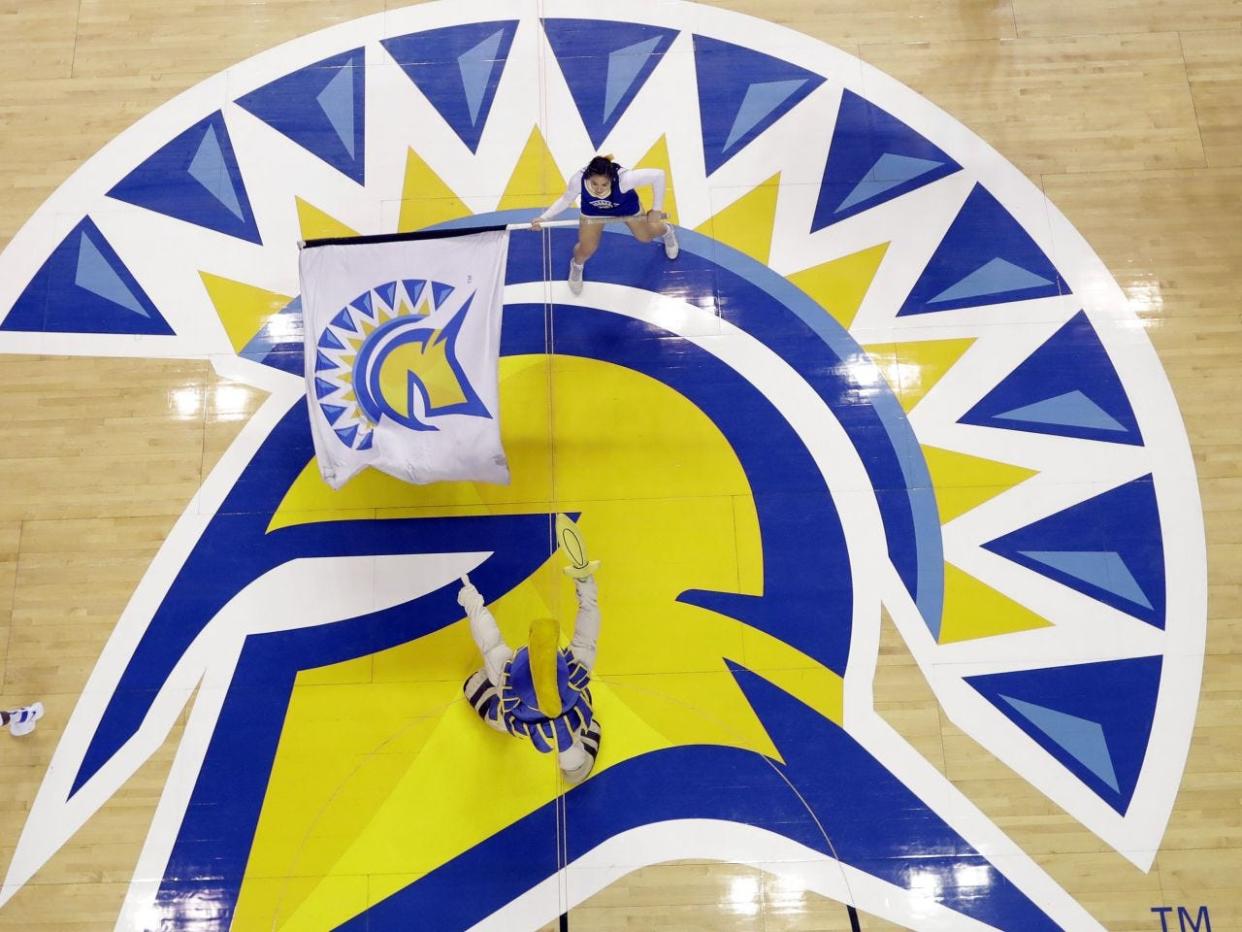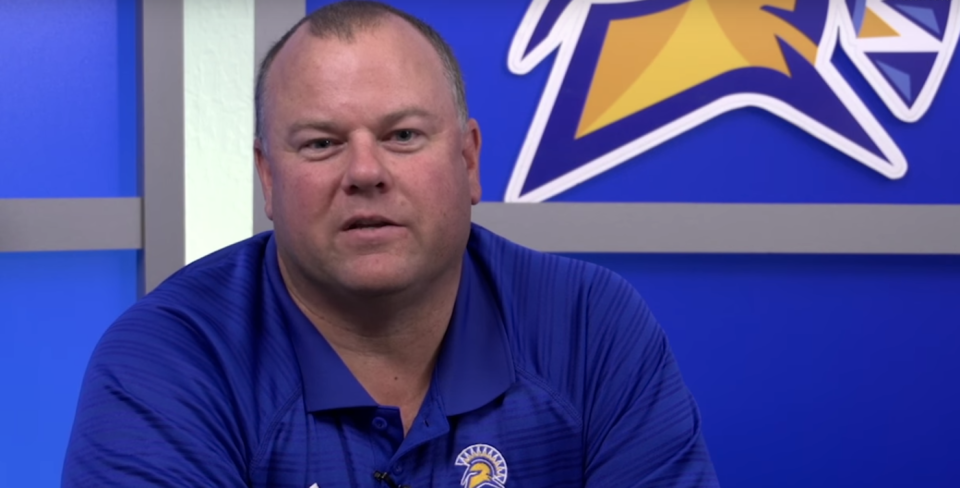In the spotlight for sex abuse claims, San Jose State University accused of cover-ups and retaliation

Top San Jose State University officials, including the athletic director and president, engaged in a pattern of covering up misconduct by staff and students and retaliating against those who reported it, according to a tort claim notice filed with the California State University System by the school’s former deputy athletic director.
Steve O’Brien, who served as the No. 2 in the athletic department, said in the claim that he was victim of such retaliation after resisting orders to discipline two employees, including the whistleblower in an ongoing sexual assault investigation first reported by USA TODAY against then-sports medicine director Scott Shaw.
Athletic director Marie Tuite fired O'Brien on March 2.
“Mr. O’Brien was fired for exposing San Jose State’s cover-up of the alleged sexual assault committed by Scott Shaw,” Christopher Boscia, O’Brien’s attorney, told USA TODAY in an emailed statement. “We also allege Mr. O’Brien was fired for uncovering widespread retaliation related to San Jose State’s NCAA compliance.”
O’Brien filed the claim, which USA TODAY obtained, on Aug. 26. In California, a person who intends to sue a public agency must first file a tort claim notice, giving the agency 45 days to investigate and potentially settle before a lawsuit can be filed. O’Brien seeks damages in excess of $25,000.
In addition to SJSU, the claim names Tuite, President Mary Papazian, Senior Associate Vice President for Personnel Joanne Wright and Senior Associate Athletic Director Eileen Daley as being complicit in the wrongful termination and in covering up the other allegations.
O’Brien claims Tuite regularly threatened employees with termination and discipline and told them, “Those who make attempts on the life of the king aren’t kept in the kingdom very long.”
"Although we disagree with many of Mr. O’Brien’s assertions, it is our practice not to comment on personnel matters,” San Jose State said in an emailed statement.
Tuite told a reporter on the phone Wednesday that she would call back later. She did not. Neither Wright nor Daley replied to messages from USA TODAY.
The claim alleges Tuite told O’Brien to reprimand women’s swimming coach Sage Hopkins for dubious reasons when the coach resurfaced sexual assault allegations from a decade ago against Shaw.

The notice says Tuite similarly asked O’Brien to discipline compliance director David Rasmussen, who had just investigated a football player for marijuana use and a baseball player for gambling, both of which are NCAA violations.
The disciplinary orders against Hopkins and Rasmussen, O’Brien’s claim says, amounted to retaliation against the two employees for their roles in reporting and investigating potential misconduct. O’Brien’s refusal to comply, he says in the claim, cost him his job.
Hopkins and Rasmussen declined to comment for this story. Hopkins’ attorney, Paul Smoot, said Hopkins also filed a tort claim with the CSU System, in addition to multiple grievances that the CSU System is investigating. Smoot declined to share the claim notice with USA TODAY.
In April, USA TODAY reported that SJSU launched its second investigation into allegations of sexual misconduct against Shaw by at least 17 female swimmers. During an investigation in 2009-10, swimmers said Shaw massaged their breasts and groin areas, often beneath their undergarments, when they sought treatment for other parts of their bodies.
Read the full investigation: San Jose State reinvestigates claims athletic trainer inappropriately touched swimmers
The university quietly cleared Shaw of wrongdoing after its first investigation. It opened the second investigation in December 2019 after Hopkins shared the allegations with the NCAA and other outside entities.
Shaw denied the allegations through his attorney.
Papazian hired an outside investigator to review the allegations and asked the CSU System’s Title IX coordinator to supervise the investigation.
Shaw resigned from the university last month, allowing him to avoid disciplinary action, though the CSU System said its investigation is continuing anyway.
‘No-win choice’
O’Brien came to San Jose State in 2017 with experience as a high-level athletics administrator at the Naval Academy, the University of California-Santa Barbara and Santa Clara University. His tort claim asserts he had an exemplary record, and Tuite gave him the highest possible ratings on his performance reviews, a raise, bonuses and praise.
In late 2019, O’Brien said, he began to push back on what he believed could be retaliatory orders against Hopkins and Rasmussen.
In early 2018, Hopkins compiled and shared with SJSU officials a nearly 300-page file of the swimmers’ accounts from 2009-10, as well as allegations that Tuite and other officials over the years retaliated against him and his team for speaking out against Shaw. Hopkins shared the file with multiple state and federal agencies and the NCAA, imploring the school to reopen its investigation, O’Brien’s claim says.
According to the claim, the NCAA notified SJSU that it lacked the resources to investigate itself but strongly encouraged SJSU to renew its investigation. SJSU “heeded the recommendation,” O’Brien’s claim says.
Papazian told USA TODAY in April that she decided to reopen the investigation after seeing the file but did not mention involvement by the NCAA in the decision.
Two months after SJSU reopened the investigation, Hopkins believed it was suffering from the same “serious flaws” as the original and said as much to the NCAA and others, O'Brien's claim says. Hopkins accused SJSU of having “spoliated evidence” he’d provided a year earlier and explicitly named Tuite and Daley as being complicit in a cover-up.
Shortly thereafter, the claim asserts, Tuite ordered O’Brien to discipline Hopkins for allegedly sending hostile emails to Daley, the senior associate athletic director, that made her fear for her safety.
Tuite delegated this duty to O’Brien because she had a conflict of interest due to the investigation, the claim says.
When O’Brien asked to see the emails, the claim says, Wright, the senior associate vice president for personnel, refused to provide them.
O’Brien said he stressed his concerns to Wright that disciplining Hopkins could be construed as retaliation against a whistleblower and Wright asked if he was refusing to do his job.
O’Brien “immediately understood that SJSU was giving him a ‘no-win’ choice to either discipline Hopkins on Tuite’s behalf and risk retaliating against a whistleblower, or refuse to take Tuite’s directive, and appear insubordinate,” his claim says.
On Feb. 10, O’Brien sent a written complaint to the CSU System’s Office of General Counsel, laying out his concerns. He did not receive a “substantive response,” his claim says.
O’Brien said he carried out Tuite’s orders, which included informing Hopkins of “performance concerns” and a change of supervisors. The university administered a no-contact order between Hopkins and Daley.
When Hopkins asked during the meeting if the measures were retaliatory, O'Brien conceded it was possible. Tuite and Wright accused the two of collusion, the claim says.
That month, Tuite barred O’Brien from attending the Mountain West women’s basketball tournament, which he had planned and was the primary administrator for, his claim says.
Days after that, Tuite fired O’Brien without explanation. Tuite and Papazian separately denied his appeals, his claim says.
NCAA violations
Contributing to O’Brien’s firing, his claim says, was his resistance to separate orders from Tuite to discipline Rasmussen.
According to the claim, Tuite scrutinized Rasmussen’s work late last year after he found a baseball player had violated NCAA rules prohibiting gambling on sports.
Rasmussen, who reported to O’Brien, discovered the athlete had participated in 170 gambling wagers. Rasmussen disclosed the violation to the NCAA, as is customary for schools to do. The NCAA ruled the athlete ineligible and upheld its decision upon appeal from the athlete, who admitted to the gambling, O’Brien’s claim says.
Tuite supported Rasmussen’s steps to self-report the NCAA violation but questioned his “process” after the athlete’s parents angrily attacked her, the claim says. Tuite accused Rasmussen of not being “supportive enough” of the athlete and asked O’Brien to investigate Rasmussen’s handling of the matter, the claim says.
O’Brien investigated and found no fault by Rasmussen, who had followed NCAA reporting processes and reached the right conclusion, O’Brien said in his claim, noting that “170 admitted instances of gambling was not a close call.”
According to O’Brien, Tuite ordered him in December to discipline Rasmussen during a midyear performance review and admonished him for having a “condescending tone.” O’Brien grew concerned that such action could amount to retaliation, he said in his claim.
Months later, Tuite took further issue with Rasmussen when he ordered a drug test of a football player in February, O’Brien’s claim says.
Rasmussen had received a report from Hopkins that a star football player’s home, shared with swimmers, smelled of marijuana and had drug paraphernalia, the claim says. Smoking marijuana is against NCAA rules. Rasmussen ordered drug testing for all the athletes in the home, the claim says.
Tuite supported the decision, then admonished Rasmussen after the football coach “angrily confronted” her over the busting of his star player, O’Brien’s claim says. Tuite again raised concerns about the “process” and accused Hopkins and Rasmussen of racial profiling, the claim says. Though the test results for the swimmers “became known,” Tuite prevented the employee who administered the test from releasing the football player’s result, O’Brien claims.
O’Brien said that in a meeting with Wright on Jan. 31, he raised his “widespread concerns over a culture of retaliation against compliance” within the athletic department. Days later, the claim says, he wrote Wright again after Tuite pressed him to write Rasmussen a negative performance review.
Feeling Wright had not addressed his concerns, O’Brien took them to Papazian’s chief of staff, then to the general counsels for both SJSU and the CSU System in early February. SJSU never “substantively addressed” his concerns either, his claim says.
This article originally appeared on USA TODAY: San Jose State University accused of cover-ups and retaliation


